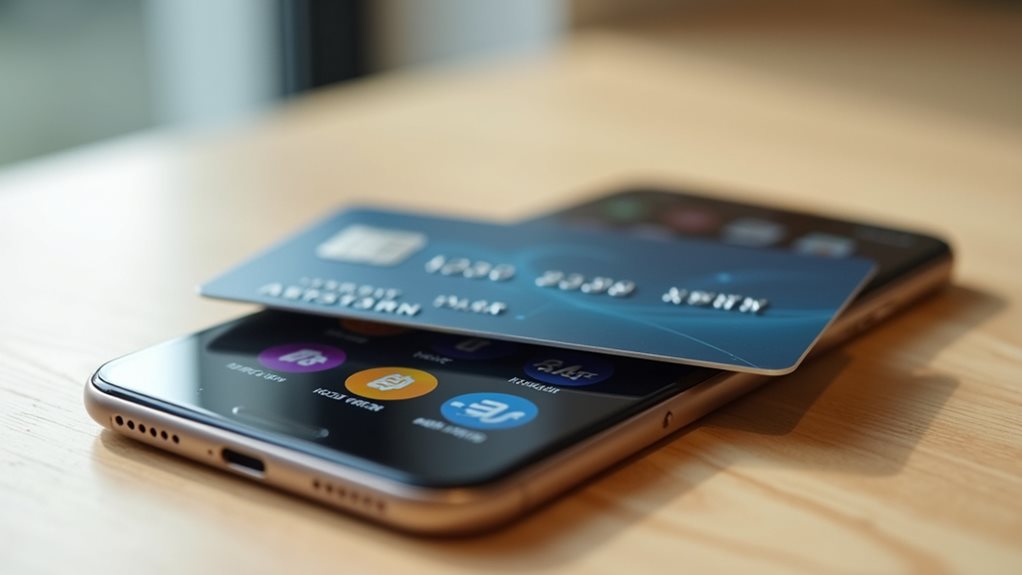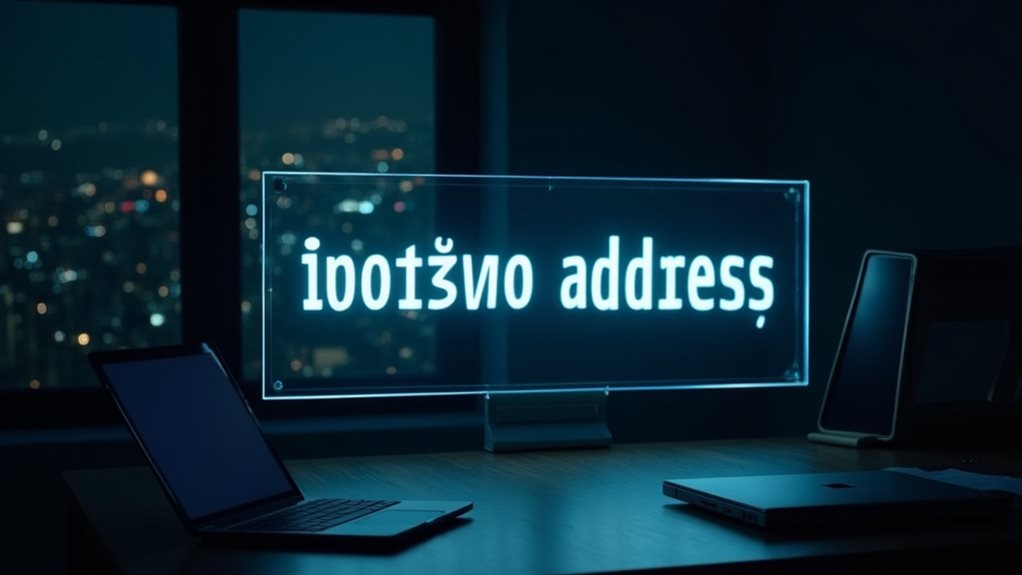To buy crypto with a credit card, first choose a reputable exchange like Coinbase or Kraken that accepts cards. Create an account, complete identity verification with your ID, and set up two-factor authentication. Add your credit card details, select your desired cryptocurrency, enter purchase amount, and confirm the transaction. Watch out for fees—they’re steep, often 3-5% plus possible cash advance charges. Transfer your crypto to a secure wallet afterward. The rest of this guide tackles the nitty-gritty details.
Understanding Credit Card Crypto Purchases: Benefits and Limitations

While traditional credit cards have been around for decades, their evolution into the crypto space represents a considerable shift in how we interact with digital currencies.
You’re now looking at rewards programs that dish out Bitcoin instead of airline miles. Pretty wild, right?
The perks are obvious. Immediate crypto purchases. No waiting for bank transfers. Rewards of 1.5-3.5% back in actual cryptocurrency. With bank crypto services becoming widely available through 1,200 U.S. banks, accessibility is reaching new heights.
Instant crypto access plus earning digital assets with every swipe? Traditional credit cards could never.
But let’s not kid ourselves. The downsides exist too. Crypto prices swing wildly – what’s worth $100 today might be $70 tomorrow. Ouch.
Security protocols are constantly battling new threats, with both credit card fraud and crypto theft on the rise. Cryptocurrency offers enhanced security as your data isn’t stored in centralized hubs vulnerable to breaches.
Fees can add up fast. And regulations? They’re all over the place, depending on where you live.
This payment ecosystem is rapidly expanding, with the crypto credit card market expected to grow from $1.6 billion in 2024 to a substantial $9 billion by 2034.
Researching Reputable Cryptocurrency Exchanges That Accept Credit Cards

Three major players dominate the terrain when you’re looking to buy crypto with plastic. Coinbase, Crypto.com, and Kraken lead the pack with solid exchange reputation and credit card compatibility.
Each offers different perks—Coinbase with its 200+ cryptocurrencies, Crypto.com with its potentially zero-fee transfers, and Kraken with its variable fee structure.
Here’s the kicker: your bank might block you anyway. Wells Fargo, Citibank? Not fans of crypto purchases. Tough luck.
These exchanges aren’t just throwing open their doors to anyone with plastic. They’re serious about security—expect KYC verification processes and multi-factor authentication. No shortcuts. After purchasing crypto, you might consider using dedicated crypto payment cards to spend your digital assets seamlessly at merchants worldwide.
For enhanced security, cold storage wallets are recommended, following Coinbase’s model of storing 98% of user funds offline.
Payment gateways like MoonPay and Shift Markets handle the actual processing. MoonPay specifically operates in over 160 countries, bridging traditional payment methods to digital assets. They’re the middlemen you never think about. But they matter. They’re why your transaction doesn’t get flagged as suspicious. Usually.
Account Creation and Identity Verification Requirements
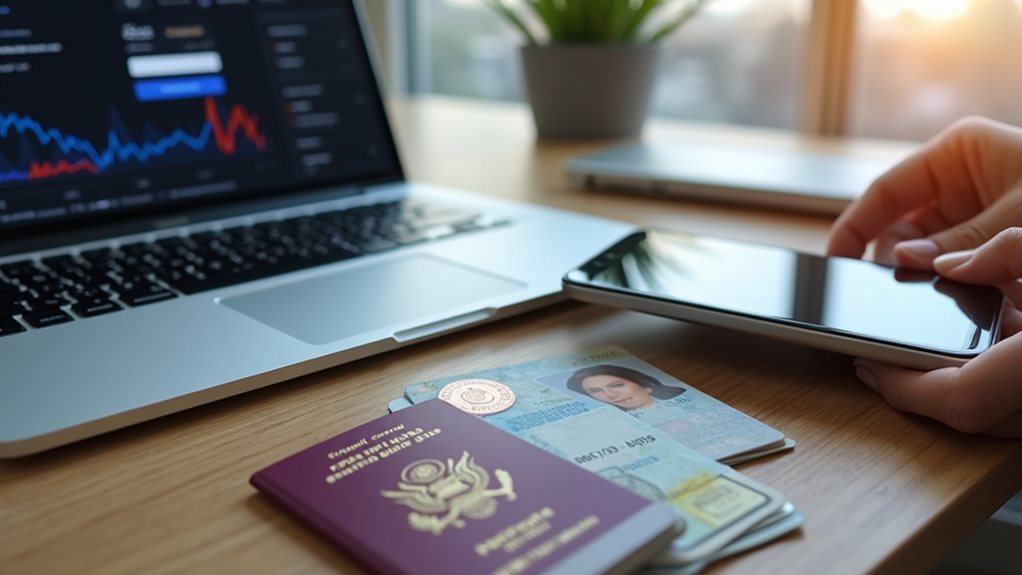
So you’ve found a crypto exchange that takes your credit card. Now for the fun part: proving you’re actually you. Seriously.
Account setup isn’t simple anymore. You’ll need to provide your legal name, birthdate, and address. Most exchanges demand your phone number or email too.
Then comes the identity verification—prepare to get cozy with your passport or driver’s license. They’ll want clear images. No blurry shots accepted. This verification step is critical as exchanges must comply with regulatory compliance mandates to prevent money laundering and fraud. Traditional methods of simply uploading ID copies are increasingly being replaced by more sophisticated verification systems as they are easily compromised by determined fraudsters.
Don’t be surprised when they ask for a selfie. It’s not for their scrapbook—they’re comparing your face to your ID using facial recognition tech. Creepy? Maybe. Necessary? Absolutely.
This whole process can take hours or days. Blame AML and KYC regulations. Without verification, you can’t buy crypto with that credit card. Period.
Setting Up Strong Security Measures for Your Crypto Account
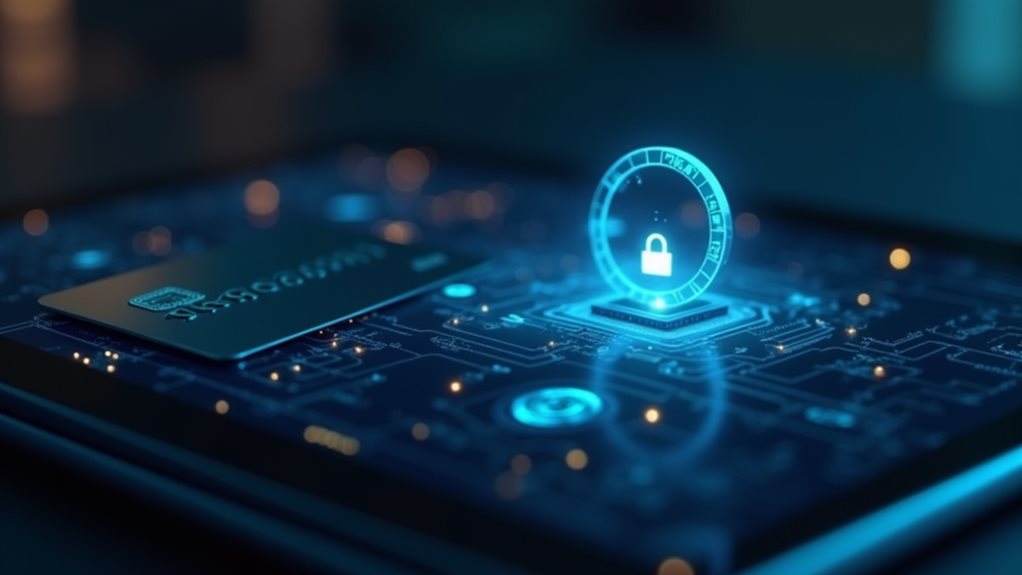
After completing that identity verification gauntlet, you’d think your crypto expedition would get easier. Nope. Security’s just beginning.
MFA implementation is non-negotiable. Set it up immediately. Authenticator apps beat SMS codes every time. Withdrawal whitelisting? Do it. Your future self will thank you when hackers can’t drain your account.
Private key management isn’t optional either. Hardware wallets beat software ones. Period. Keep those keys offline and encrypted. Never share them. Ever. Storing the majority of your crypto assets in cold storage significantly minimizes exposure to cyber threats. Consider keeping recovery phrases in multiple secure locations for added protection.
Account monitoring alerts you to fishy business. Enable notifications for logins and withdrawals. Something looks weird? Act fast. Remember that all blockchain transactions are irreversible, making prevention your only real protection.
Secure networks matter too. Use VPNs. Update your devices. Don’t save passwords in browsers—that’s just asking for trouble.
Regular audits might sound boring, but they’re your financial lifeline. Check transaction histories. Review access logs. Stay paranoid.
Adding Your Credit Card to a Cryptocurrency Exchange Platform
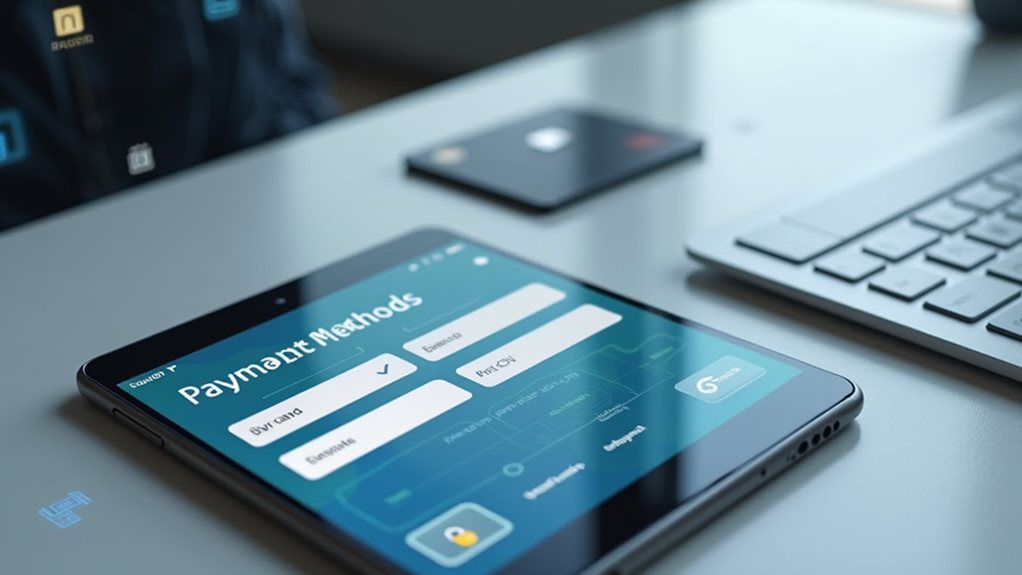
While identity verification feels like an invasive dental procedure, adding your credit card to a crypto exchange isn’t much better. But it’s necessary.
Log into your account and find the Payment Methods section. Select “add card” and prepare for the interrogation. Enter your card number, expiration date, and that sacred three-digit CVV. Virtual cards work too, if you’re paranoid.
The verification process happens quickly—assuming you’ve already completed the KYC hoops. Your card gets screened against sanction lists. Fancy. Many exchanges implement enhanced due diligence which may require additional verification steps beyond basic KYC requirements. Registration requires submitting high-quality images of your government ID with all four corners visible.
Credit card security is supposedly first-rate with encryption protocols. That’s what they all say, right?
Remember: not all banks allow crypto purchases. Some will block your transaction faster than your mom blocks sketchy Facebook friends. Their loss.
Navigating Purchase Limits and Credit Card Restrictions
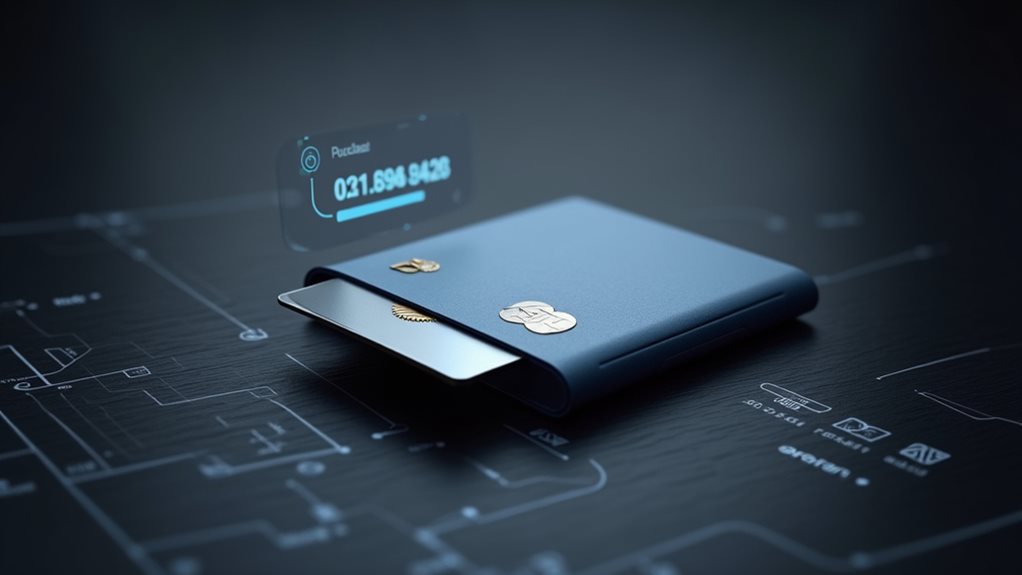
When you think you’ve finally cleared all the hurdles to buy crypto, you’ll smack into a wall of purchase limits and credit card restrictions. Surprise! Traditional banks really don’t want you playing in the crypto sandbox.
Most major banks flat-out block crypto transactions.
- Chase, Citibank, Wells Fargo? Nope. They’re not interested in your crypto adventures.
- Purchase limits vary wildly between exchanges—sometimes as low as a few hundred bucks.
- If your transaction actually goes through, expect to pay through the nose with cash advance fees and sky-high interest (hello, 30% APR!).
- American Express might let you buy, but good luck finding an exchange that accepts it.
- VISA and Mastercard technically allow crypto purchases, but your bank probably doesn’t.
Some fintech-focused banks may be more permissive with crypto transactions, so it’s worth checking with your specific card issuer before attempting a purchase. As an alternative, many investors use debit cards which generally face fewer restrictions when purchasing cryptocurrency.
Executing Your First Cryptocurrency Transaction With a Credit Card

So you’ve maneuvered through the minefield of bank restrictions and decided to throw caution to the wind.
Now for the moment of truth. Head to your chosen platform’s buy page. Enter the amount you want. Punch in those credit card details—number, expiration, CVV. Double-check everything, especially that wallet address. Get it wrong? Kiss your crypto goodbye. Unlike spot ETFs, direct crypto purchases require careful attention to wallet addresses.
The buy screen awaits. Enter amount, card details, verify that wallet address. Mistakes here are permanent and costly.
Review those fees. They’re not pretty. Be aware that some credit card providers may treat your crypto purchase as a cash advance, resulting in higher fees and interest rates. Hit confirm and wait.
Transaction confirmation tips: watch for email notifications and monitor your wallet balance. Could take minutes, could take hours. Platforms like RockItCoin offer user-friendly interfaces that make tracking your transaction status much simpler.
Remember, cryptocurrency volatility impact is real. That $100 purchase? Might be worth $80 tomorrow. Or $120. Who knows?
Finally, move your digital treasure off the exchange. Exchanges get hacked. Your wallet? Your responsibility.
Managing Transaction Fees and Hidden Costs
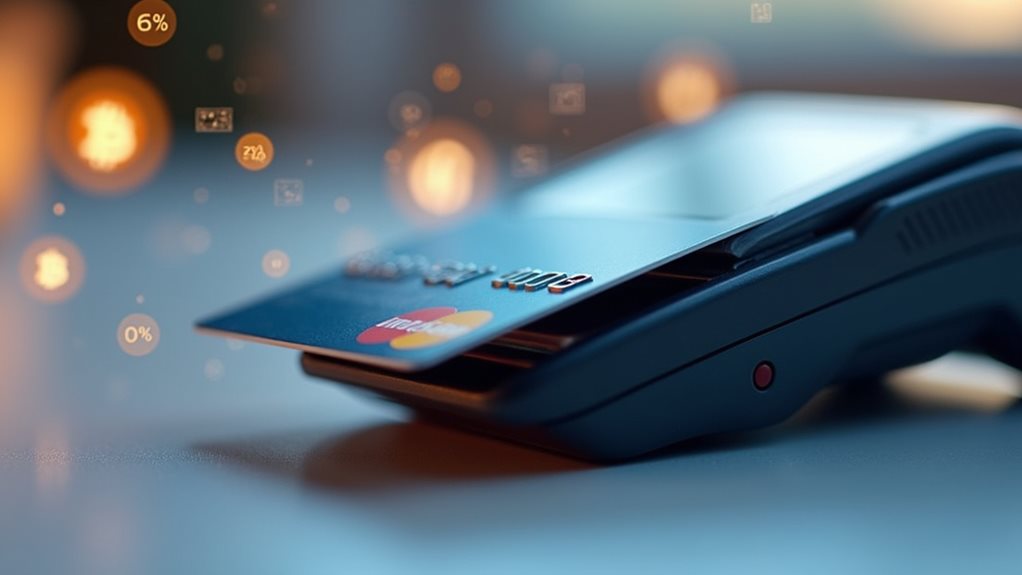
Beneath the shiny surface of crypto card transactions lurks a beast with many heads—fees. They’re everywhere, and they’ll eat your profits if you’re not careful.
A proper fee comparison reveals the shocking truth: you’re paying more than you think.
When conducting a cost analysis, watch for:
- Credit card processing fees (1.5-3.5%) – higher for premium reward cards
- Platform-specific charges – Coinbase slaps you with a whopping 3.99% for card purchases
- Conversion costs (0.5-2.5%) – the silent profit-killer
- Foreign exchange fees (0-3%) – crossing borders costs extra
- Hidden scheme fees – card networks want their cut too
The math isn’t pretty.
That $100 Bitcoin purchase? Could actually cost you $107 or more when all fees combine. Ouch.
Online crypto purchases typically incur higher interchange fees than in-person transactions, further increasing your total cost.
Bank transfers are significantly cheaper at just 1.49% fee compared to credit cards, making them worth considering for larger purchases.
Securely Storing Your Newly Purchased Cryptocurrency
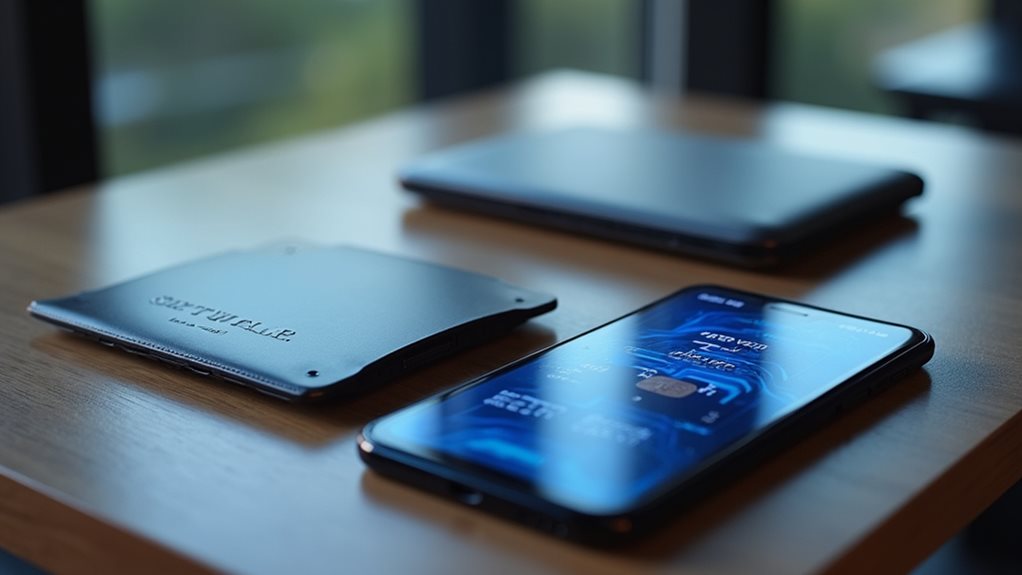
After completing your crypto purchase with a credit card, you’re left facing an equally critical challenge: where to store your digital gold.
Wallet security isn’t optional—it’s vital.
Storage options range from ultra-secure hardware wallets like Ledger Nano to convenient but vulnerable hot wallets. Remember: “not your keys, not your coins.”
Crypto backup is non-negotiable; store those recovery phrases offline, away from prying eyes. Consider storing seed phrases on metal backup plates for maximum durability and protection against physical damage. Different wallet types serve different needs. Hardware for the big bucks, hot wallets for pocket change. Consider wallets with customizable fees that allow adjustments based on transaction urgency and network conditions.
For serious risk mitigation, implement multiple security features: two-factor authentication, biometric access, the works. Using a strong VPN connection can provide an additional layer of protection by encrypting your transactions from potential attackers.
Access management matters. Don’t connect to sketchy apps. Keep different wallets for different purposes.
And please, update your wallet software regularly. Hackers love outdated code. They’re counting on your laziness.
Tax Implications of Credit Card Crypto Purchases
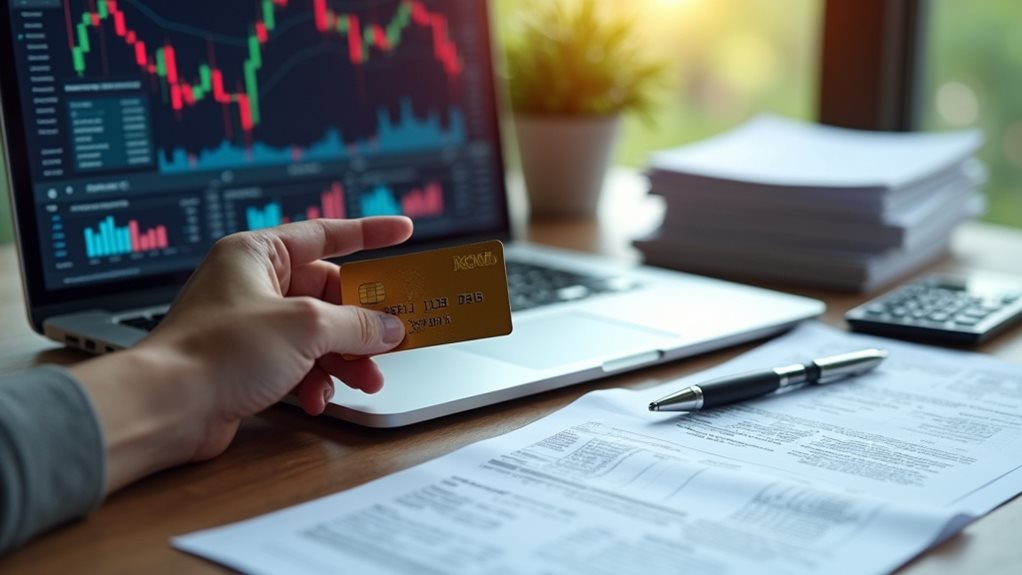
While swiping your credit card for crypto feels deceptively simple, the tax consequences lurking behind each transaction are anything but. The IRS doesn’t mess around with crypto—they see it as property, not currency. Period.
When it comes to cryptocurrency regulations and tax implications, here’s what you need to know:
- Buying crypto with your credit card isn’t taxable (yet)
- The tax hammer drops when you sell, trade, or buy that latte with your Bitcoin
- Hold for more than a year? Lower tax rates. Under a year? Prepare to pay up to 37%
- Crypto rewards from spending are typically not taxable—small victories, folks
- Using crypto-backed credit cards triggers a taxable event—surprise!
Your capital gain or loss is determined by comparing the fair market value of the cryptocurrency at the time of transaction to what you originally paid for it.
Record everything. The IRS is watching. They always are. Some debit cards allow for lump sum conversions from crypto to fiat, which are still taxable but simplify your reporting process.
Frequently Asked Questions
Can I Earn Credit Card Rewards When Purchasing Cryptocurrency?
Most traditional credit cards don’t award rewards for cryptocurrency purchases. However, you can earn crypto rewards through specialized crypto credit cards like Crypto.com, Gemini, or Coinbase when making everyday purchases.
How Long Does Credit Card Verification Typically Take on Exchanges?
Credit card verification typically takes just minutes if your details are accurate. You’ll encounter a quick verification process that enables near-instant transactions, though some exchanges may require up to 24 hours in certain cases.
Are There Age Restrictions for Buying Crypto With Credit Cards?
Yes, you must be at least 18 years old to purchase crypto with credit cards. This age limit exists because of legal requirements for KYC verification protocols that all regulated exchanges must enforce.
Can I Use Someone Else’s Credit Card to Buy Cryptocurrency?
No, you can’t legally use someone else’s credit card to buy cryptocurrency. It’s fraud, violates credit card legality, and creates serious payment risks including criminal charges, account suspension, and loss of purchased assets.
What Happens if My Credit Card Transaction Is Declined?
If your transaction is declined, you’ll need to verify billing information, check your available credit, and contact your bank about potential restrictions on crypto purchases. Most declined payments stem from card issuer policies or transaction issues.
